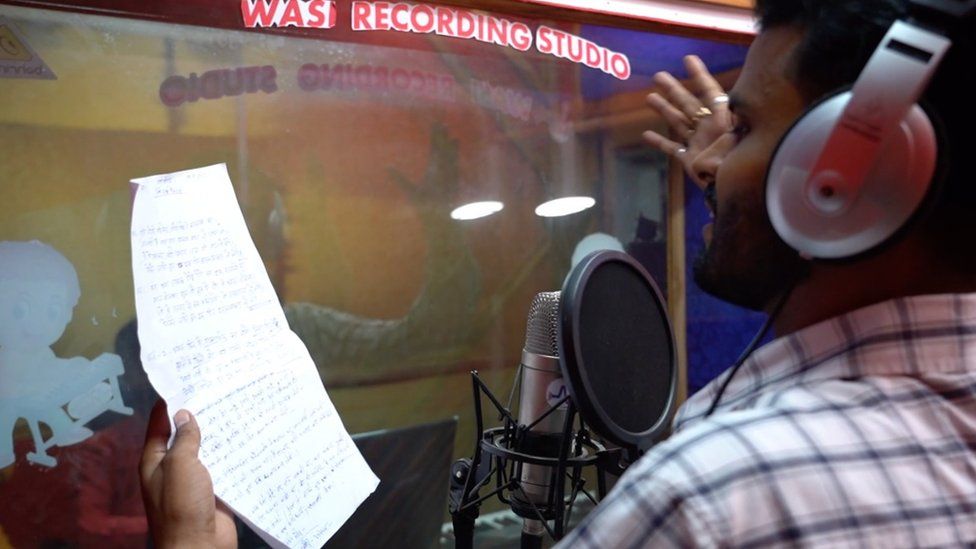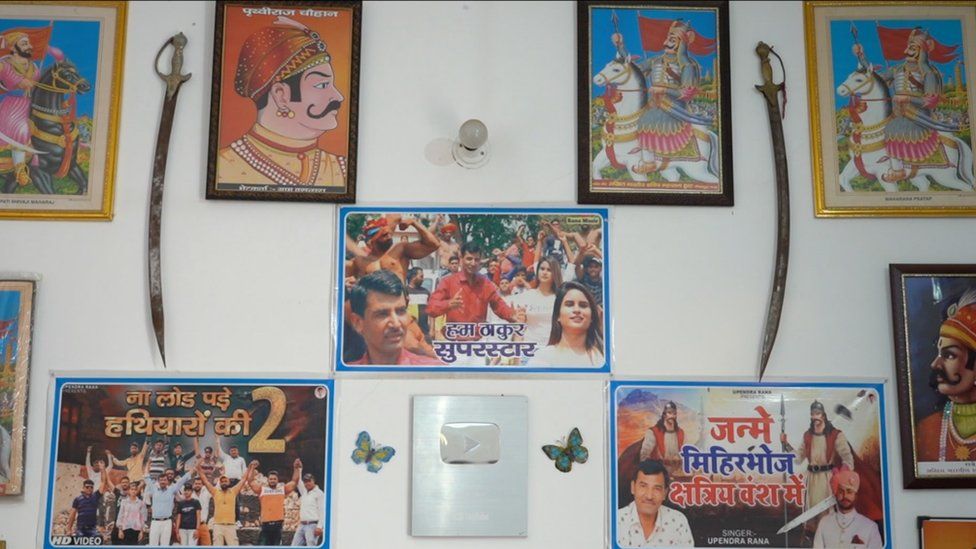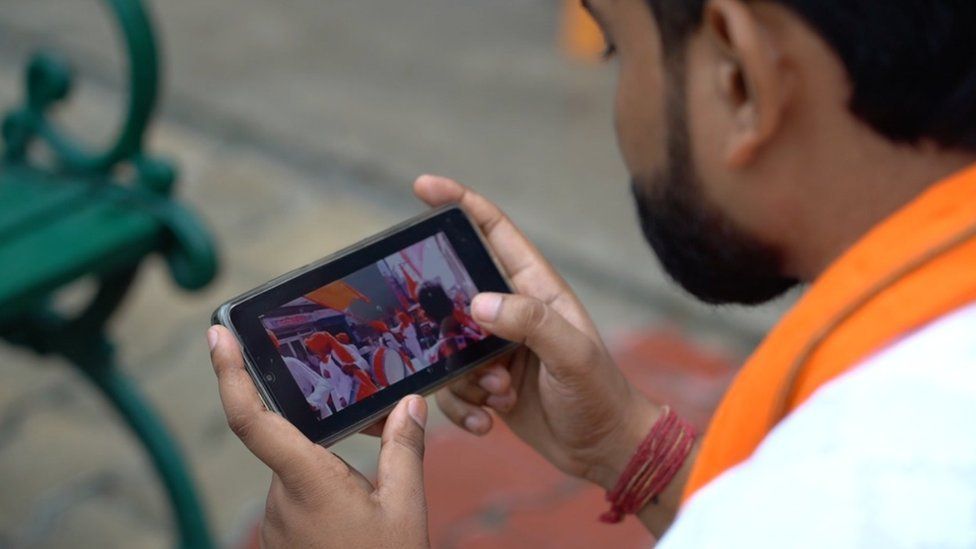Sandeep Chaturvedi, 26, is readying to record his new song in a makeshift studio in the city of Ayodhya in India’s northern state of Uttar Pradesh.
The song is about a mosque that has became a subject of controversy after Hindus claimed the right to worship there. It is riddled with innuendos against Muslims. But Chaturvedi says the song could get him back in business.
Chaturvedi’s songs are part of a growing trend of music on YouTube and other social media platforms where supporters of the Hindu right-wing spew venom at Muslims.
The lyrics are abusive or threatening. They are usually based on the premise that Hindus have suffered for centuries at the hands of Muslims – and now it’s payback time.
Writer and political analyst Nilanjan Mukhopadhyay says that in addition to being a source of income, such music fetches their singers some attention. But for him, this is not music. “This is a war-cry. It’s as if music is being used to win a war. This is a misuse of music and this has been happening for years.”

Chaturvedi started his career as a singer of devotional songs about a decade ago, but he changed tack a few years later when he decided to compose songs about “Hinduism and nationalism”. The idea, he says, was to get an image makeover.
He hit a jackpot of sorts when a music video he produced in 2016 became an overnight sensation amongst the right-wing Hindu nationalist ecosystem.
The lyrics of are too incendiary to be reproduced here. But the tone of the song was straightforward: a warning to the Muslim community about what will happen the day Hindu nationalism rises.
Chaturvedi says this song garnered millions of views on YouTube before his channel got suspended, following thousands of complaints. He blames Muslims for reporting his song as inappropriate content.
He rues losing “millions of subscribers”, but refuses to divulge the money he was making from YouTube. He said it costs him around 20,000 rupees (£207; $253) to create a music video.
“I wasn’t making much money from YouTube. What’s more important is the recognition I got as a nationalist-revolutionary singer,” he insists.
Chaturvedi has since created a new channel on YouTube. But the number of views on some of the content he uploaded has not been encouraging. He is hoping to change that with his latest song.
Often accused of targeting Muslims through his music, Chaturvedi is unapologetic. “If I plead with folded hands to get what is mine, will you agree? You won’t. So we have to be provocative, don’t we?”
Upendra Rana is another creator making similar music in Dadri near Delhi.
His mission is to “correct” history and his songs are paeans to Hindu warriors where Muslim rulers are portrayed as villains.
“Many things that are true have been hidden while falsehoods have been imposed on us,” he claims while talking about the history taught in schools.

Rana says that he gets a steady income from the videos he uploads on YouTube.
“We are bringing foreign currency to India. YouTube pays in dollars,” he beams, pointing to wall-mounted YouTube Silver Play Button that shares space with images and portraits of Hindu warriors.
Ever since Rana moved on from composing devotional and romantic songs to ones with “historical” overtones, he has become a kind of star in Dadri. He has close to 400,000 subscribers on YouTube and many of his songs have been viewed millions of times.
Rana says that creating a music video costs him a mere 8,000 rupees (£84; $100). He has his own set-up to record and edit videos and a team comprising a cameraperson and an editor.
Mr Mukhopadhyay says the trend of weaponising music against minorities is reminiscent of events that have occurred in the past. He recalls the controversial foundation stone-laying programme in Ayodhya in 1989 organised by the right-wing Vishwa Hindu Parishad (VHP) which culminated in the demolition of the Babri mosque in 1992.
“Just before that, an industry of audio tapes had sprung up. They contained religious songs and so-called provocative slogans related to the Ram Janmabhoomi issue [Hindus believe that Ayodhya is Lord Ram’s birthplace] and these tapes used to be played in processions to mobilise people.”
Three decades on, the tone has become shriller.
Compositions proclaiming “if you want to live in India, learn to say Vande Mataram (“I praise you, Mother”)… and learn to live within your limits”, or “thinking of Hindus as weak is the enemy’s mistake” make no effort to hide who they are targeting.
These songs have also helped right-wing organisations “mobilise” their cadres.

“Youngsters like these songs as they raise their enthusiasm and morale,” says Pinky Chaudhary, who heads the right-wing Hindu Raksha Dal group. He argues that such songs help create awareness among the youth.
“I feel a sudden rush of energy when I listen to these songs. They remind me of the things we were subjected to at one point of time and where we have reached now,” says Vijay Yadav.
A sketch-artist currently pursuing his studies from the Lalit Kala Akademi, India’s national academy of fine arts, Mr Yadav, 23, says he loves listening to this kind of music.
The “sudden rush of energy” Mr Yadav talks about was believed to be on display this April when violent clashes were reported from several states during Hindu festivals.
During these incidents, offensive music blared through loudspeakers when Hindus took out religious processions and moved close to Muslim-dominated areas.
In some of these clashes, incendiary and provocative songs – including Chaturvedi’s composition from 2016 – were allegedly instrumental in triggering the violence.
Chaturvedi denies such allegations.
“I am just trying to create awareness through my music. Nothing comes from love. We have to fight and snatch what is ours.”
BBC
Source – https://www.bbc.com/news/world-asia-india-62432309




